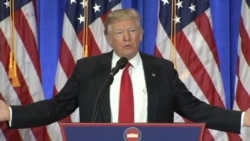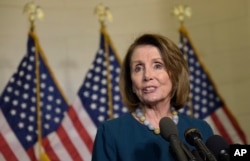U.S. Director of National Intelligence James Clapper said Wednesday he told President-elect Donald Trump the intelligence community did not create a document featuring claims Russia compiled information to attempt to compromise Trump.
Earlier this week, the BuzzFeed digital media site posted online what it said was the full dossier in question, which alleges tawdry personal Trump conduct on a visit to Moscow and that Russia’s government had been “cultivating, supporting and assisting Trump” for years.
Clapper said in a statement Wednesday that he told the president-elect the intelligence community has not made any judgment that the information is reliable, and that he emphasized to Trump that he does not believe it was leaked to the media by intelligence sources. Clapper said it is part of his obligation to make sure policymakers have the most complete picture possible of matters that might affect national security.
Trump acknowledged Clapper's call in a Twitter comment Thursday, claiming that Clapper denounced "the false and fictitious report that was illegally circulated. Made up, phony facts. Too bad!"
Unsubstantiated info
The president-elect was given a two-page synopsis of the unsubstantiated information last Friday, when he also was given a classified briefing on alleged Russian interference in the U.S. presidential election. President Barack Obama was given the same information a week ago.
Trump angrily rejected the reported claims during his first news conference as president-elect on Wednesday.
"I think it is a disgrace that information would be let out. I saw the information. I read the information outside of that meeting. It’s all fake news. It’s phony stuff. It didn’t happen," he said.
WATCH: Trump denounces 'fake news'
The president-elect’s attorney, Michael Cohen, told reporters the allegations in the document are false and were invented to malign Trump.
In Moscow, Russian presidential spokesman Dmitry Peskov said Wednesday the claims were meant to hurt U.S.-Russian relations.
"No, Kremlin doesn't have any compromising information on Trump. This information [the report] does not correspond to reality and is nothing else by an absolute fabrication," he said.
Pelosi's concerns
House Democratic Minority Leader Nancy Pelosi told reporters Wednesday any financial or personal allegations against President-elect Donald Trump "cannot have an impact on the national security of the United States of America."
Pelosi declined to get into the details of the latest revelations alleging ties between Russia and Trump, noting the information had been in circulation among journalists for some time and had remained uncorroborated.
Pelosi did say she had broader concerns about the president-elect's approach to the U.S.-Russia relationship. "I always wondered what did Russia have on Donald Trump?" she told reporters.
Pelosi cautioned that her judgements were based on information in the public domain and not on any classified briefings she has received. The House Democratic leader declined to speculate on the consequences of the allegations if they are found to be true.
'Kompromat'
Such materials, known in Russian as “kompromat,” are frequently prepared by some intelligence agencies to create negative publicity for purposes of blackmail and to ensure loyalty.
“It should not be a surprise to anyone that the Russians are always looking for dirt on any politician,” House of Representative intelligence committee chairman Devin Nunes told reporters.
“I would not jump to any conclusions. This seems maybe taken a little out of context,” added Nunes, a Republican who has worked with the Trump transition team.
The U.S. intelligence community has concluded that Russian President Vladimir Putin ordered an operation to meddle with the U.S. election with the aim of hurting the campaign of Democrat Hillary Clinton and helping Trump win. He won the decisive Electoral College count over Clinton, but lost the popular vote to her.
Trump, who acknowledged at his press conference that Russia meddled in the election, assumes power on January 20 for a four-year term in the White House.
He said Thursday that former New York Mayor Rudy Giuliani, an early campaign supporter, will advise him on private sector cyber security problems and the latest technology to combat hacking intrusions.
VOA Senior Diplomatic correspondent Steve Herman and VOA House of Representatives correspondent Katherine Gypson contributed to this report.








